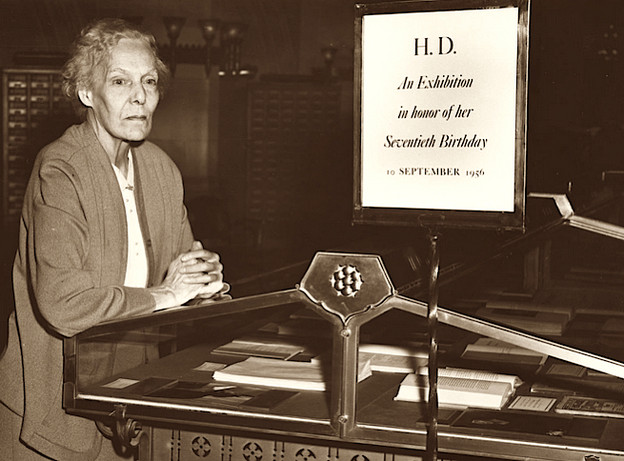
The I as hieroglyph (PoemTalk #84)
H.D., 'Helen in Egypt'

Julia Bloch, Dee Morris, and Annette Debo joined Al Filreis for this extended episode of PoemTalk, and their task — to give a sense of the whole of H.D.’s lyric epic Helen in Egypt through a discussion of five selected small parts — certainly pushed at the limit of PoemTalk’s scope and mode. But afforded an extra fifteen minutes of air time, and given what we like to think is a careful selection of poems, we hope and expect that new readers of this modernist epic — this radical revision of the Helen myth — will be intrigued enough to purchase a copy of the 304-page New Directions volume and explore further for themselves. And even those experienced with the open-ended ways of this long poem will find something new in these expert responses to each other and to Al’s questions.
 The first three poems are sections 6, 7, and 8 of Palinode, Book One, pages 11–17 in the book — where (in all three) Helen is encountering Achilles in Egypt (not in Troy); they are near the ocean, on the coast in the dark. Then we move to a section later in the work, section 3 of Palinode, Book Four (pages 53–54 in the book). The speaker here is apparently Achilles, and he is recalling what happens to him when he met Helen’s gaze as she (or her specter) stood on the ramparts of Troy. Finally we discuss a
The first three poems are sections 6, 7, and 8 of Palinode, Book One, pages 11–17 in the book — where (in all three) Helen is encountering Achilles in Egypt (not in Troy); they are near the ocean, on the coast in the dark. Then we move to a section later in the work, section 3 of Palinode, Book Four (pages 53–54 in the book). The speaker here is apparently Achilles, and he is recalling what happens to him when he met Helen’s gaze as she (or her specter) stood on the ramparts of Troy. Finally we discuss a poem near the very end of the book — section 7 of Eidolon, Book Three (pages 251–52 of the New Directions edition). Here the speaker uses the third person and seems to speak from Achilles’s point of view; this beautiful poem makes a notable distinction on the matter of Helen’s beauty.
poem near the very end of the book — section 7 of Eidolon, Book Three (pages 251–52 of the New Directions edition). Here the speaker uses the third person and seems to speak from Achilles’s point of view; this beautiful poem makes a notable distinction on the matter of Helen’s beauty.
(At left: H.D. visiting Egypt in 1923. She was present at the opening of King Tut’s tomb.) The Helen of Egypt recordings are the only recordings on PennSound’s H.D. author page, and apparently they are the only recordings of H.D. extant. She taped herself reading from this work in Zurich in 1955. Our five sections of Helen in Egypt take H.D. some seven and a half minutes to read, approximately three times the usual length of poems featured on PoemTalk. We ask our listeners’ indulgence as they wait for us to return with our commentary on the work. Here are links to the recordings and (in four of five sections) the texts of the selected poems:
Palinode, Book 1, section 6: MP3 [TEXT, see below]
Palinode, Book 1, section 7: MP3 [TEXT]
Palinode, Book 1, section 8: MP3 [TEXT]
Palinode, Book 4, section 3: MP3
Eidolon, Book 3, section 7: MP3 [TEXT]
BONUS TRACK: PoemTalk proudly presents an additional recorded conversation about H.D. featuring Annette Debo, Dee Morris, and Julia Bloch. With Al Filreis they discuss H.D.’s version of imagism, with a look in particular, toward the end, at the poem “Sheltered Garden.” Here is a link to the text of that poem, and here is a link to the recording of this additional discussion.
PoemTalk this time was engineered by Chris Martin and edited by Allison Harris. Special thanks to Annette Debo for making the long journey from western North Carolina to join us at the Writers House for these conversations. We recommend to all Annette’s scholarship on H.D., for example The American H.D. and her edition of Within the Walls and What Do I Love?
*
Palinode, Book One, section 6:
How did we greet each other?
here in this Amen-temple,
I have all-time to remember;
he comes, he goes;
I do not know what memory calls him,
or what Spirit-master
summons him to release
(as God released him)
the imprisoned, the lost;
few were the words we said,
but the words are graven on stone,
minted on gold, stamped upon lead;
they are coins of a treasure
or the graded weights
of barter and measure;
“I am a woman of pleasure,”
I spoke ironically into the night,
for her had built me a fire,
he, Achilles, piling brushwood,
finding an old flint in his pouch,
“I thought I had lost that”;
few were the words we said,
“I am shipwrecked, I am lost,”
turning to view the stars,
swaying as before the mast,
“the season is different,
we are far from — from —”
let him forget,
Amen, All-father,
let him forget.